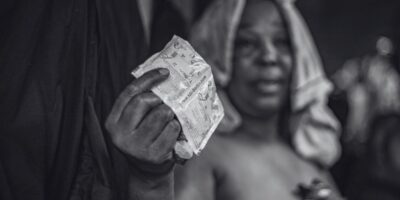“We have requests coming from everywhere, but we can’t supply them,” laments a guild owner in Saint-Michel-de-L’Attalaye interviewed by AyiboPost
In less than a year, the Saint-Michel entrepreneur, Renaud Louissaint, has had two very trying experiences.
In January 2023, while delivering six barrels (drums) of clairin to customers in Port-au-Prince, heavily armed bandits intercepted the truck and forcibly recovered all the merchandise onboard, near Bon Repos, at the northern entrance to the capital.
The entrepreneur had nearly 330,000 gourdes, a huge loss for his economy.
“Never again in Port-au-Prince,” he said to himself after what happened.
Two bank loans got him back on his feet.
Thus, relying on his small team of six employees, Renaud Louissaint resumed production a few months later by delivering his products to Saint-Marc and Gonaïves.
But, in December 2023, his company received a second blow.
This time, the gang called “Kokorat san ras” seized a van which was transporting an order worth more than 430,000 gourdes destined for Saint-Marc, in lower Artibonite.
“They forced us to unload the van and sent us home empty-handed,” the entrepreneur tells AyiboPost.
In less than a year, the Saint-Michel entrepreneur, Renaud Louissaint, has had two very trying experiences.
This is the first time Renaud Louissaint recorded such losses since starting this business in 2013.
Located in the Artibonite department, the town of Saint-Michel-de-L’Attalaye is known for its very popular clairin.
This product, along with other sugarcane derivatives, is the commune’s main commodity.
Since at least 2019, clairin producers have found themselves confronted with a growing rise in attacks perpetrated by armed bandits in Artibonite. This situation has led to significant losses for some players, or even the outright closure of their distilleries.
Read also: Small businesses are closing due to gangs in Bas Artibonite
“We have requests coming from everywhere, but we can’t supply them,” explains Fesly Dorcely, a guild owner.
Since 2019, Dorcely sold his products mainly in lower Artibonite, and was able to count on five regular customers who bought his clairin in bulk.
With this, the former law student sold at least 25 drums and his business could earn up to 250,000 gourdes per month.
The activities of the Savien gang, dubbed “Gran grif” since 2020 in the commune of Petite-Rivière de l’Artibonite caused him to lose his clients, one after the other.
“I just spent two months without even being able to deliver a single order. It’s very difficult to keep going like this,” the young entrepreneur explains to AyiboPost.
In addition to Bas-Artibonite, Dorcely supplied a few customers in the Haitian capital. The installation of “tolls” by bandits on the roads, particularly in Canaan, increased the price of transporting a drum from 750 to 5,000 gourdes, from Saint-Michel to Port-au-Prince. An increase of more than 560%.
Read also: Haiti: Drivers leave the sector. They’ve had enough of the gangs.
“It’s an unbearable situation for someone with loans from the bank, who has to pay interest every month in a context where the product is no longer selling like before,” laments Dorcely.
Although the price of clairin varies depending on the time of year, the costs associated with tolls are driving up the price of the barrel. “A few years ago, it sold for 35,000 – now it costs more than 50,000 gourdes,” Dorcely told AyiboPost.
Since 2020, clashes between armed gangs have plunged a large part of the Artibonite department into chaos. Between the confiscation of their land and harvests, looting and kidnapping, producers are at an impasse.
We have requests coming from everywhere, but we cannot supply them.
From January 2022 to November 2023, more than 1,000 people were kidnapped and 350 others killed in lower Artibonite, according to a report from the United Nations Integrated Office in Haiti (BINUH).
Producers and traders experience daily attacks from the “Kokorat san ras” gang which operates in the municipalities of Gros-morne and L’Estère. They are also under attack from the « Gran grif » gang, which controls Petite-Rivière de l’Artibonite, Liancourt and other towns. This prevents them from delivering orders to the North, the West and even the interior of the Artibonite department, where their main customers are located.
Many producers have product waiting to find buyers.
For Emmanuel Alexis, coordinator of the Saint-Michel guild owners’ association, some have no other alternative than to turn to the local market.
This is not realistic, according to the association manager, since the local market is already saturated.
This creates deficits for producers to the point that some producers “prefer to close their guilds”.
For the economist Moïse Elius, originally from Saint-Michel, the sale of clairin represents a very important part of the commune’s economy. Thanks to this business, many families are able to meet their needs.
“When things don’t work well, there are cascading consequences,” explains the economist.
Despite an observed increase in the surface area cultivated with sugarcane in recent years, difficulties in selling the final product due to insecurity are affecting the lifestyle of Saint-Michel producers and merchants.
“Some are losing their jobs, which aggravates other already existing social problems,” he concludes to AyiboPost.
Moïse Elius knows at least one friend who was kidnapped at the beginning of the year on their way to deliver an order to Gonaïves. They were released for ransom two weeks later.
This creates deficits for producers to the point that some producers “prefer to close their guilds”.
According to a study published in 2022, more than 50% of the Saint-Michel population was food insecure in 2020.
For years, climatic hazards have affected food production, essential to the local diet. What’s more, residents face road infrastructure problems to get food from other areas.
The increased insecurity exacerbates this situation.
Renaud Louissaint tries to adapt. Of his six employees, he was only able to retain two.
Faced with the damage inflicted on his economy, he is forced to limit his lifestyle to what is strictly necessary: paying his children’s school fees and meeting the most essential needs.
“I continue to produce, despite the risks, because it is the only way to repay my loans to the bank,” the entrepreneur concludes to AyiboPost.
English translation by Sarah Jean.
Cover image: © ANNE MYRIAM BOLIVAR, GPJ HAÏTI
Watch this report made by AyiboPost in 2022 about the famous « clairin Saint-Michel »:
Stay in touch with AyiboPost through :
► Our WhatsApp channel : click here
► Our WhatsApp Community : click here
► Our Telegram canal : click here







Comments